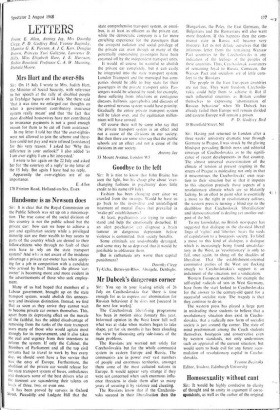Mr Dubcek's dangerous corner
Sir: You say in your leading article of 26 July on Czechoslovakia that 'there is time enough for us to express our abomination for Russian behaviour if he does not [succeed in the next few weeks].'
The Czechoslovak liberalising programme has been in motion since January this year. Informed opinion in the West knew full well what was at stake when matters began to take shape, yet for six months it has been clouding the view by discussing only side-issues of the main problems.
The Russians are worried not solely for Czechoslovakia but for the whole communist system in eastern Europe and Russia. The communists are in power over vast numbers of ,people and enormous territories, amongst them some of the most cultured nations in Europe. It would appear very strange if they were not concerned when such enormous influ- ence threatens to elude them after so many years of securing it by violence and cheating.
The Russians know that if the Czechoslo- vaks succeed in their liberalisation then the Hungarians, the Poles, the East Germans, the Bulgarians and the Rumanians will also want more freedom. if this happens then the com- munist state in Russia will become very insecure. Let us not delude ourselves that the infamous letter from the remaining Warsaw Pact countries to the Czechoslovaks is any indication of the feelings .)f the peoples of these countries. Thus, Czechoslovak assurances of remaining loyal to Russia, Comecon, the Warsaw Pact and socialism are of little com- fort to the Russians The people in the East European countries are not free. They want freedom. Czechoslo- vakia could help them to achieve it. But if such influential countries as Britain confine themselves to expressing 'abomination of Russian behaviour' when Mr Dubcek has already failed then Europe will remain divided and eastern Europe will remain a prison. P. D. Godfrey Bird 18 Bromfield Street, NI






































 Previous page
Previous page